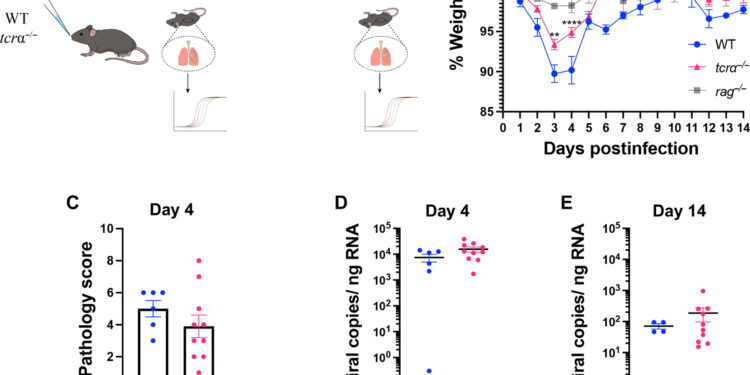SARS-CoV-2 MA10 causes less severe illness in tcrα−/− mice compared to wild type (WT). (A) WT and tcrα−/− mice were infected with 1 × 105 PFU/SARS-CoV-2 MA10 mouse. On days 4 and 14 postinfection, lungs were collected and virus RNA was measured by RT-qPCR. (B) WT and tcrα−/− change in weight of mice after SARS-CoV-2 MA10 infection. (VS) WT pathological scores and tcrα−/− mouse lung sections at day 4 postinfection. (D) Viral RNA levels on day 4. (E) Day 14 after infection. Credit: Scientists progress (2024). DOI: 10.1126/sciadv.adg5461
When mice lacking key adaptive immune cells were infected with the SARS-CoV-2 virus, even though they were unable to clear the virus, they developed no symptoms, revealing that the virus’s own inflammatory immune response body to fight the infection was the cause of the pathology. according to a new study.
While the inflammatory response of adaptive immune cells, such as B and T lymphocytes, eliminates the virus in the body, it also causes the characteristic symptoms of COVID-19.
The results of the study “Adaptive immune cells are required for SARS-CoV-2-induced pathology,” published January 3 in Scientists progressalso point to a potential treatment against the effects of the virus.
“Unlike other major respiratory viruses that are circulating, without an adaptive immune response, SARS-CoV-2 alone does not appear to cause the damage that leads to significant pathology,” said Avery August, professor of immunology at the College. of Veterinary Medicine (CVM) and vice-rector. August and Hector Aguilar-Carreño, professor of virology, also at CVM, are co-corresponding authors of the study.
“This means we can explore therapies that modulate the immune response, so we can dampen the parts that cause inflammation while leaving only the parts that are important for eliminating the virus,” August said.
In the study, researchers used a strain of SARS-CoV-2 adapted to infect mice, because strains that infect humans do not transmit well to mice. The approach allowed the study authors to directly infect a variety of genetically engineered laboratory mice lacking elements of their immune systems, including mice that do not produce B or T cells, which would otherwise recognize and would react to pathogens.
During normal infection, mice begin to lose weight around day three or four and continue to do so until around day seven, when many mice are often euthanized after losing too much weight, but some survive, depending on their viral load. The scientists monitored the amount of infection in the lungs, in part to make sure they were actually infected.
They also examined lung tissue for indications of a robust immune response, such as the presence of B and T lymphocytes and other inflammatory immune cells, as well as cytokines, signaling proteins that direct immune cells to a site of infection and are associated with inflammation.
The team’s initial hypothesis was that mice lacking B and T cells would show severe symptoms and would not be able to withstand SARS-Cov-2 infection. For example, when the same engineered mice were infected with a mouse-adapted flu, they had to be euthanized due to significant weight loss without immune cells to protect them.
“We were very surprised when it turned out that (the mice infected with SARS-CoV-2) did not lose weight, they did not show any symptoms or pathology,” August said. At the same time, ordinary laboratory mice (called wild-type mice) used as controls showed the characteristic symptoms of SARS-CoV-2, including immune cells accumulating in the lungs and an inflammatory response to clear the virus.
When infections in the genetically modified mice lasted 30 days, they still did not experience weight loss, behavioral changes, or inflammation in their tissues.
In August, Aguilar-Carreño and colleagues also tried an intermediate approach by infecting mice that had B cells but lacked the majority of their T cells, and these were also less affected by the SARS-CoV strain. 2.
“Without B or T cells, the virus can replicate, but it does not cause any damage, because the damage is caused specifically by the adaptive immune system,” August said.
Additionally, the researchers used genetically modified mice that specifically lacked a protein important for T cell activation, and these mice were also somewhat protected from COVID-19 symptoms.
More information:
Brian Imbiakha et al, Adaptive immune cells are required for SARS-CoV-2-induced pathology, Scientists progress (2024). DOI: 10.1126/sciadv.adg5461
Provided by Cornell University
Quote: Research finds mice without immune cells show no symptoms of SARS-CoV-2 (January 11, 2024) retrieved January 11, 2024 from
This document is subject to copyright. Apart from fair use for private study or research purposes, no part may be reproduced without written permission. The content is provided for information only.



